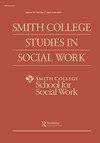无阶级:社会工作实践中的古典主义与白色乡村谚语
IF 0.9
Q2 SOCIAL WORK
引用次数: 0
摘要
摘要本文试图以白人农村贫困为例,探讨和刻画阶级主义对社会工作实践和话语的隐性影响。将探讨这一人群的人口统计和具体的心理社会需求。还将研究对白人农村穷人的文化态度,以及对这一群体存在的负面和贬义情绪的起源。社会工作参与使这些负面偏见和陈规定型观念长期存在的问题将在当前和历史上得到解决。这里举例说明的历史性例子是20世纪初社会工作者参与国家优生学运动和根除钩虫的努力。这些历史性的例子将被用作考察古典主义信仰的背景。本文运用边界理论和隐性偏见的概念,试图论证基于阶级地位的归属或不归属的创造。本文使用作者作为一名临床医生在主要贫困的农村地区工作的综合案例材料,强调在不承认跨阶级二人组中隐含的阶级偏见的情况下进行临床实践的风险。本文章由计算机程序翻译,如有差异,请以英文原文为准。
Classless: Classism in Social Work Practice and the Example of White Rural Proverty
ABSTRACT This paper seeks to explore and depict the implicit force of classism impacting social work practice and discourse using the example of white rural poverty. The demographics and the specific psychosocial needs of this population will be explored. Cultural attitudes toward the white rural poor will also be examined, as well as the origin of the negative and pejorative sentiments that exist toward this population. Social work’s participation in perpetuating these negative biases and stereotypes will be addressed, both currently and historically. The historic examples illustrated herein are social works’ participation in the national eugenics movement and the efforts to eradicate hookworm in the early 20th century. These historic examples will be used as the backdrop to the examination of classist beliefs. By using boundary theory and the concept of implicit biases, this paper seeks to demonstrate the creation of belonging or not-belonging based on class standing. Using composite case material from this writer’s own experience as a clinician working in primarily impoverished rural enclaves, this paper will highlight the risk of practicing clinically without acknowledging the implicit class bias at play in a cross-class dyad.
求助全文
通过发布文献求助,成功后即可免费获取论文全文。
去求助
来源期刊

SMITH COLLEGE STUDIES IN SOCIAL WORK
SOCIAL WORK-
CiteScore
1.50
自引率
10.00%
发文量
10
期刊介绍:
Smith College Studies in Social Work focuses on the vital issues facing practitioners today, featuring only those articles that advance theoretical understanding of psychological and social functioning, present clinically relevant research findings, and promote excellence in clinical practice. This refereed journal addresses issues of mental health, therapeutic process, trauma and recovery, psychopathology, racial and cultural diversity, culturally responsive clinical practice, intersubjectivity, the influence of postmodern theory on clinical practice, community based practice, and clinical services for specific populations of psychologically and socially vulnerable clients.
 求助内容:
求助内容: 应助结果提醒方式:
应助结果提醒方式:


